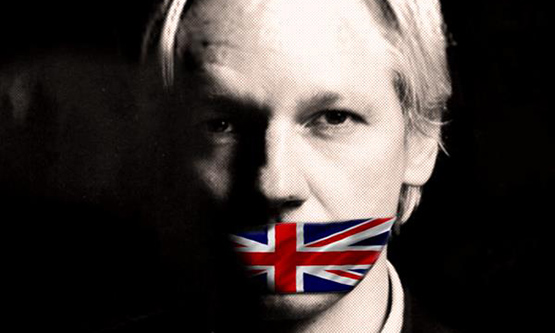
On 4 May, Westminster Magistrates Court set a new date in September for the next hearing in Julian Assange’s extradition case. Assange faces trumped up charges of espionage in the US, relating to the 2011 publication by Wikileaks of documents revealing war crimes committed by the US and its allies in Iraq and Afghanistan. Seamus O’ Tuairisc reports.
Assange’s extradition hearing initially began on 24 February and lasted four days before being adjourned. As reported in FRFI 275, these first four days were characterised by displays of extreme bias against and contempt for Assange and his legal team by the presiding judge Vanessa Baraitser, violations of extradition law and politically motivated deviations from standard practice in extradition cases. These included keeping Assange in a bullet-proof glass box for the duration of the hearing and holding the hearing at the high security Woolwich Crown Court, rather than, as is customary, at Westminster Magistrates Court.
The case was originally scheduled to resume on 18 May; however at a telephone hearing on 27 April Assange’s legal team asked for it to be postponed on the grounds that, had it gone ahead as planned, the Covid-19 pandemic would have seriously hampered Assange’s case by preventing him, his legal team and vital witnesses from attending court in person.
Assange is currently held at high security Belmarsh prison, where there appear to have been two deaths from the coronavirus, although only one of these has been officially recognised as such by the Ministry of Justice, which has refused to disclose the total number of cases at the prison. However, a reported 150 Belmarsh prison officers went into self-isolation in April, which suggests that the virus had spread rapidly through the prison.
On 25 March, Assange’s legal team lodged an application to the court for him to be released on bail until his hearing. The request was filed on the grounds that he was too ill to prepare his defence, and that the lockdown measures that have been imposed on prisons in response to the pandemic have made access to his lawyers virtually impossible. The application was denied by Baraitser, on the grounds that he had previously ‘absconded’ while on bail, by seeking sanctuary in the Ecuadorean embassy, and that the pandemic did not provide sufficient reason to ignore this.
Covid-19 poses a direct and serious threat to Julian Assange’s life. He has a long history of chronic health problems, including a long term respiratory disorder, as well as a life-threatening heart condition which he developed while confined to the Ecuadorian embassy between 2012 and 2018. Years spent without access to adequate healthcare have taken a further toll, and he also has mental health problems as a result of being stuck inside the embassy for so long. All this is further exacerbated by being held in solitary confinement at HMP Belmarsh. The deterioration in his health was acknowledged by more than 65 medical professionals across six countries who signed an open letter in November 2019 calling on Home Secretary Priti Patel to release him, have him transferred to hospital and put a halt to his extradition to the US.
The pandemic is clearly also being exploited by the British state to further hinder Assange’s chances of a fair hearing, by denying him access to his lawyers and to the materials he needs to prepare his defence ahead of September.
And it is not just inside the prison and courtroom that the pandemic is being used against Assange, but outside as well. On 4 May, a small group of peaceful, socially distanced demonstrators gathered outside Westminster Magistrates Court while a court management hearing was taking place in the case. Among the demonstrators was Julian Assange’s father, John Shipton. The demonstrators kept two metres apart from one another at all times; however police officers – who did not adhere to social distancing, and were not wearing any personal protective equipment – moved in swiftly to shut the protest down, claiming that under Covid-19 legislation, ‘protesting is unlawful’. This is incorrect, as there have been no specific provisions made for protesting in any legislation passed in response to the pandemic, and the government has not opted out of Articles 10 and 11 of the European Convention on Human Rights, which protect freedom of expression and assembly.
The case of Julian Assange is one of many examples of how governments are exploiting lockdown measures to crack down on dissent. The British state is collaborating with the US to have Assange extradited in order to make an example of him to deter anyone else who might dare to expose the crimes of imperialism. If he were to die in prison while awaiting extradition, the British government would be culpable of manslaughter.
We need to continue to put pressure on the British government to release Assange from custody, so that he can receive the medical attention he desperately requires, as well as being able to access and communicate with his legal team in order to prepare an adequate defence case in the run up to his trial. Once this happens, we must continue the fight for Assange to be granted a fair trial and to prevent his extradition to the US from going ahead.
Free Julian Assange!
No punishment for exposing imperialist war crimes!
FIGHT RACISM! FIGHT IMPERIALISM! 276 June/July 2020




